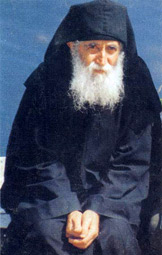Tears of Repentance
(
03.04.2009
)
 Repentance is baptism with tears. In his repentance, the one experiences the second baptising, the second birth. Apostle Peter, by his renounce betrayed Christ in some way. But, because “he wept bitterly” (Mathew 26, 75 and Luke 22, 62) he received forgiveness for his fall. Therefore, he was washed, he was purified by his honest repentance, which he carried deep inside. You see, God firstly created the earth, the sea, the whole matter and after that, from the dust, He created man. The man is born bodily first, and even after that, at the Baptism he is re-born spiritually. From God’s matter, with water and the Holy Spirit, with God’s grace – “with water and Spirit” (John 3,5) – a new man is created.
Repentance is baptism with tears. In his repentance, the one experiences the second baptising, the second birth. Apostle Peter, by his renounce betrayed Christ in some way. But, because “he wept bitterly” (Mathew 26, 75 and Luke 22, 62) he received forgiveness for his fall. Therefore, he was washed, he was purified by his honest repentance, which he carried deep inside. You see, God firstly created the earth, the sea, the whole matter and after that, from the dust, He created man. The man is born bodily first, and even after that, at the Baptism he is re-born spiritually. From God’s matter, with water and the Holy Spirit, with God’s grace – “with water and Spirit” (John 3,5) – a new man is created.
- Does it mean Elder, that God, as He created man from the dust then, so that now, on the Baptising, uses water to create him again?
- Yes, water, in its nature, symbolises cleansing, and that’s why the priest is dipping the man into the water while baptising him. The man cleans from himself the consequences of the original sin, he purifies from his own sins, enlightens by the grace of God, he takes the vestment of Christ on, and becomes a new, again born, man. That is the deed of Baptism. Jesus Christ said this perfectly clear to Nicodemus, as Nicodemus asked Him how can happen the man to be re-born. “Most assuredly, I say to you, unless one is born of water and the Spirit, he cannot enter the
- Elder, what is the sorrow that creates joy (joyful sorrow)?
- It’s a joy that originates from the sorrow because of the sin that has been made. So, in such a sorrow, both pain and joy are existing. That’s why it is called joyful sorrow. Man feels sorry that he grieved Christ, and he is happy for feeling the God’s consolation. The sinner, when repents honestly, gets forgiveness from God, feels the consolation from God deep inside, and may feel the spiritual sweetness.
- Elder, may it be that the man who struggles can live his whole life in repentance?
- Indeed. If he struggles correctly, he doesn’t see his flights, but he sees his falls, living in a constant repentance. He doesn’t know that he fought against only one demon at the beginning, but later he may fight against a brigade of demons, perhaps. Because, as more force the one submits to uproot some passion and gains a virtue, the more enemies are mobilised against. Then, despite he doesn’t see any progress, he goes forward anyway. He may live in such condition until he dies, means that he does not see the progress, he may even think that he has no progress at all, because he has his falls, but in a fact, the progress is there, because he enforces the fight constantly, fighting against more and more demons every day.
Repentance is for the struggler as some handicraft that never ends. They mourn the dead, burry them and forget them …We will bewail our sins always, not stopping, until the moment we die, but with discernment and hope in Christ, Who was crucified, to give the spiritual resurrection to us.
Elder Paisios of